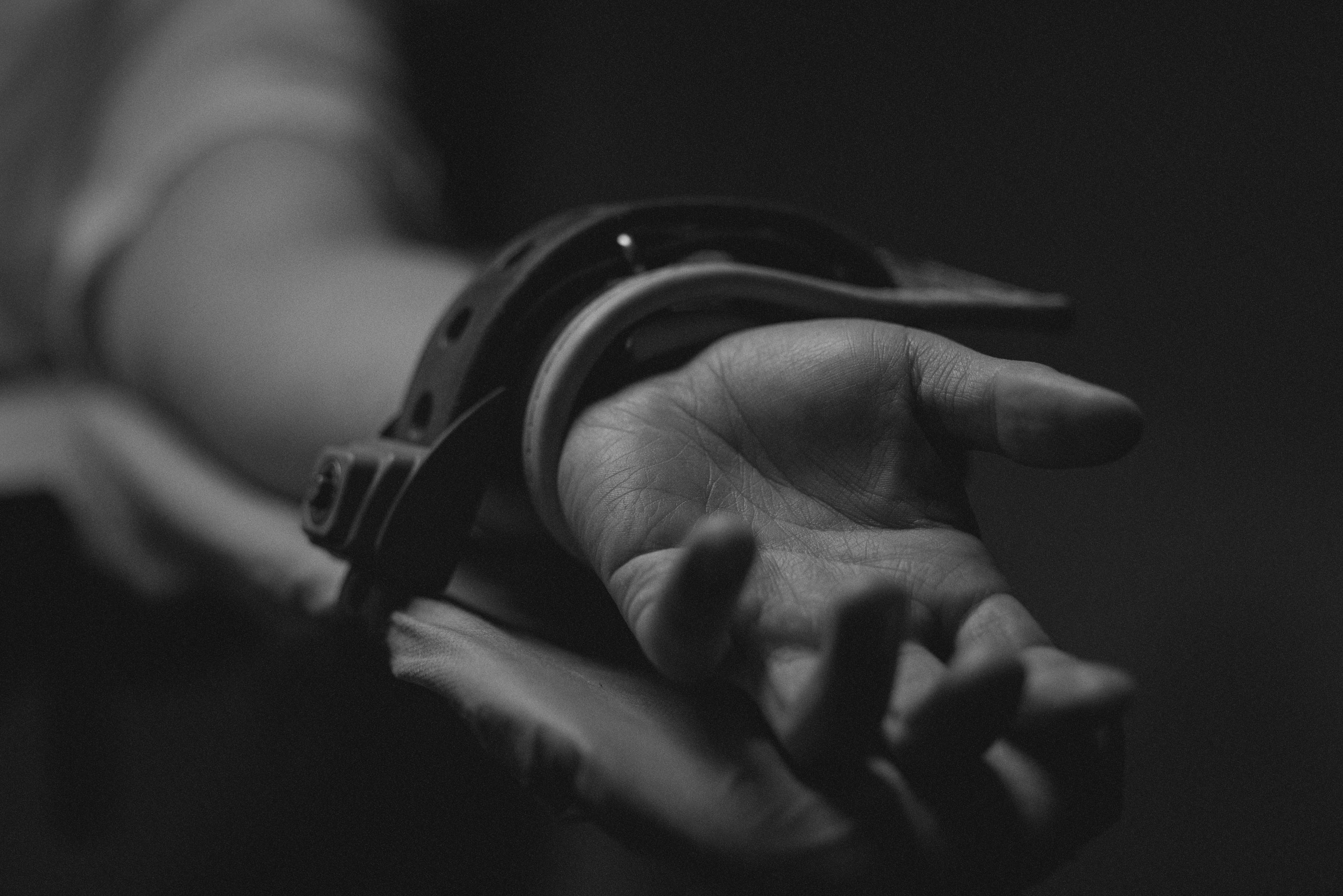
What was so important to Jesus that He willingly gave up a comfortable life? A sense of pride or importance? Or well-deserved payback? He didn’t want these things like we would expect. But the more He rejected the normal path to success, the more His impact grew. Jesus didn’t want any of these things—instead He was after a different way of living. Better than anything we could imagine.
HeGetsUs.com
Day 1
Scripture: John 15:13
Jesus’ Upside Down Priorities
There’s hardly a country or language today that does not know Jesus’ name. He’s been on nearly everyone’s “most influential” list for generations. History tells us that in Jesus’ name, armies have deployed, missions have launched, battles have been waged. But so have cups of cool water been extended to enemies and wounds bound up with forgiveness—all in his name. For centuries, Jesus’ name has been on the lips of the dying as they leave this world.
You would expect this kind of influencer, this kind of cultural titan, to execute his global agenda with extreme control and energy. But the reality is upside down.
The truth is . . . Jesus never held an office. Not mayor. Not president. Not even HOA secretary or baseball commissioner.
He never wrote a book or streamed on any media. We wouldn’t recognize his voice or his handwriting.
Jesus didn’t go to college. He never earned a degree. He held no credentials.
He never owned property. He ran no campaigns.
Jesus didn’t do any of the things we normally equate with significance.
And yet, how he spent his scant 30 years on earth changed us and changed history.
But how?
- Jesus taught another way. His words, unusual and riveting, captivated a generation. People walked miles just to listen to him. They skipped meals to stick around him. They couldn’t believe what he was asking. And while some walked away, saying it was “too much,” others did what he said and it changed the world for them.
- He served. Jesus was an equal opportunity servant—it didn’t matter to him who you were—what race, age, social status, or gender. If it was mercy and kindness you needed, he was there.
- He forgave. Even when the crowd’s opinion turned on him, and his closest friends ran, he looked past the offense and extended an unusual grace. Even when he was dying at the hand of another, he was talking about forgiveness.
- He loved. In quiet and personal ways, he put other people’s needs before his own. But also in bold and inclusive invitations, he excluded no one. It’s been said that no one loves better than when you give up your life for your friends. And that’s what he did, in the most excruciating way.
And that’s why people are still talking about him.
Consider this: How do you want to be remembered for your time on earth? Are your priorities in the right order?
Day 2
Scriptures: Luke 12:34, Matthew 6:24, 2 Corinthians 8:9

He Gave Up Financial Security
How much money will make you happy? America’s first billionaire said, “Just a little bit more.” Just a little more and you can buy that something that you believe is the secret to satisfaction. And for a beat, it might be.
But that satisfaction won’t last long term. Ask anyone who has focused their mind and motivations on material things – a big house, a nice car, a successful job, a dream vacation. But once they achieve it, they’re back wishing for something else.
Things weren’t much different in Jesus’ day. Even then money promised freedom, status, security, and popularity. Money was just as much a magnet as it is today.
But Jesus turned that financial concept upside down. He knew that people invest in what they love.
We get that. Many of us sacrifice our time, our money, even our dreams if it helps the people we love. Jesus loved people, every one of them, so he gave up what would benefit himself for them. In fact, he gave up the symbols of status to show us how to think about our stuff.
In essence he said, invest your heart in the things that God blesses and don’t worry about all the other stuff. Live for God. Live for others. Live for what’s right. You’re not going to miss out . . .
Jesus invested wisely, not in things we can own, but in relationships—and a plan to provide us a way for an amazing life. But get this, when he said, “I came to give you a rich and satisfying life,” it might look different than we imagine. It may not include luxury cars, designer handbags, or the next shiny object to hit the shelf. Ask anyone who has those things—there’s gotta be something else.
Jesus’ priorities changed his life radically. When he died, he left no inheritance, and was buried in a donated grave. He left no financial portfolio. They were in his reach but not in his priorities. He gave them all up.
And yet . . .
Jesus was so rich, people are still talking about it. For sure he had a crazy upside-down way of looking at life but who’s to say that in the end, it wasn’t Jesus who knew which way was up?
The smartest financial move you can make right now has nothing to do with money and everything to do with your priorities. Take a fresh look at what’s really important.
Consider this: What would bring the most satisfaction to my heart? Where is my treasure? You don’t need, “just a bit more.” Jesus’ life shows us a better way.
Day 3
Scripture: Luke 9:57-58

He Gave Up Comfort
Life is messy. And often hard. Not every word is kind. Not every challenge works out the way we hope. But from those messy moments can come the best things.
Jesus’ life was messy, too. He lived at a time and place when families rarely had enough to eat. The political climate was stormy. The racial tension was hot. And religious conflicts were at an all-time high. But Jesus believed something beautiful about life that few people understood, and his mission was to live it out.
So what were his options? How did Jesus choose to live in this chaotic, turbulent time?
He could have taken the easy way out.
Instead of advocating for people everyone else marginalized, he could have sat it out in his small hometown, a little north of nowhere.
Instead of teaching the counter-intuitive message of mercy and forgiveness, he could have repeated the same-old-same-old teaching that generations had fought hard for but found too hard to believe and not worth it.
Instead of building loyal followers, he could have played to the popularity of a crowd. He could have compromised for the sake of the peace.
But he didn’t. He gave up the easy way for something more beautiful.
He gave up the comforts of home.The most eligible bachelor in Nazareth could have married a nice girl, had a family of his own, and let the world go by. Instead, he stayed on mission. He never owned a home. He traded it all for life on the road. Most nights he slept under the stars. He was constantly walking to a new place with his new message, mostly on a desert road—in a day before sunglasses, sunscreen, bottled water, aspirin, chapstick, iPhones, or Nikes.
He gave up the security of a steady job. He started his career as a carpenter, just like his father. In his day and his community, there was enough work to keep him busy for the rest of his life. But his priority was to follow a different calling.
He gave up providing for himself. He could have, but he didn’t. He gave up the independence and self-esteem of making his own way in the world and traded it for a company of people who would invest in his message as they cared for his needs. He likely allowed himself to be cared for by others more for what it did for them than what it did for him.
While others stayed in their comfort zone, saying, Well, I’m just not comfortable living like that . . ., Jesus led the way and stepped out of the circle. He gave up being as comfortable as he could have been because he refused to be comfortable with a world without mercy, the culture of injustice, and a future without hope. He said and did the hard things because he needed to tell and show everyone within the sound of his voice and the reach of his message that they were loved, that their lives had meaning, and there was another way to live.
His message was that important. Messy, for sure. But so worth it that he gave up everything else.
Consider this: Where do you prioritize your comfort? What unique perspective did Jesus gain by being reliant on others?
Day 4
Scriptures: Matthew 11:28-30, Mark 1:33, Isaiah 53:6-7, Matthew 5:5

He Gave Up Power
When we write our resumés, we’re tempted to use only strong adjectives. Experienced. Results-oriented. Influential. In one place, Jesus surprisingly described himself as “meek and humble.” And when you look at how he lived and taught and led, it’s totally true.
Seriously, you’ve got to wonder why. He was such a great orator and teacher that he had people eating out of his hand, so to speak. If he would have strategically wooed them, they all would have followed his ideology. Why did he give up his power to persuade?
He could have rallied thousands of followers to unite and rise up against Rome, the occupying military force who held Israel in a death grip. Instead, he taught them to love their enemies. When soldiers came to arrest him, he stepped forward out of his group of friends and surrendered.
People wanted him to be a military giant or at least a political mastermind. The fact that Jesus seemed to give up his power disappointed those who were expecting him to be Israel’s promised Messiah. They didn’t understand why he acted so “weak.” And when they tried to force him to be their king and deliverer, Jesus just left the scene.
He could have done so much good with a little show of strength, so why didn’t he? Maybe meek, really did mean weak. Even Google describes meek as “yielding,” “compliant,” and “tame.”
But a closer look at the original meaning of the word as Jesus used it, tells a different story. Meekness really means power—but it’s power under control. Meek described war-horses who were trained to obey instantly and absolutely, no matter how brutal the battle. Meek was the courageous soldier who waited for the right show of strength at the right time and towards the right opponent. That’s far from tame.
When Jesus described himself as meek, he used the military term people would have recognized. Throughout his life, Jesus faced all kinds of power plays with the skill of a “warrior in control.” Power at the right time and never at the wrong time. And passion for the right things, and never for the wrong things. In his greatest teaching lesson, Jesus said, “blessed (thriving) are the meek . . .”
Jesus gave up the optics of power and traded it for the real thing. He gave up the right to take every political, social, radical opposition to their knees. While he had the power of absolute rule, he lived out the power of absolute love. And that meant he used his rights and power for the purposes of his love.
Consider this: Why is power so valued in our society today? Knowing that Jesus would have used that power for good, why do you think he avoided it so intentionally?
Day 5
Scriptures: Philippians 2:5-7, Mark 6:34

He Gave Up Pride
Years after Jesus left the earth the one thing that was most often said about him was that he was humble. He thought of others first, before himself—which is funny, since the other thing said about him is that he was the greatest man to ever live.
Someone who knew him well wrote, “have an attitude like Jesus had . . .” Be humble, they said. You before me. But when the ancient audience heard that, they probably winced. In that day, humility was shameful. Then, it was all about making everyone notice you were a flawless person, and should go immediately to the front of the line. Sound familiar?
But follow Jesus around in the Bible and you can watch how much he focused on others. He always prioritized serving and loving people. It’s a beautiful thing to observe. He gave up status, his pride, even his life—and traded them for people like us. In his teaching and his stories and his life we repeatedly see the humble attitude that drew people to him then and still today.
Jesus traded his status to help people.
Although he was the respected leader, Jesus got dirt under his fingernails to help people. He made himself small to get the job done.
He could hold the attention of thousands when he taught, yet he sat with people whom others ignored. He listened to them like they were the most important ones in the room.
He didn’t mind people’s crazy questions or awkward family. He had them, too.
Jesus taught about beautiful things like no one else ever had; He redefined reality.
Jesus traded his pride for humility.
He washed his students’ feet when they were filthy, something always done by a servant.
He was baptized by his cousin John in the Jordan River.
He sat and ate comfortably with those whom others rejected, and he never gave them the impression he considered himself above them.
He told stories about the most everyday things, that everyone could relate to—about fairness on the job, about making ends meet, about looking for something lost—even about a son who left home in a huff.
Jesus gave up sitting at the head table to eat and laugh with his friends and family in the kitchen. When others thought they were beneath them, he made them feel like family.
Maybe that’s why we’re still drawn to his example. Things haven’t changed all that much.
Consider this: Do you let pride get in the way of relationships? What is the relationship between being humble and being a servant to others?
Day 6
Scriptures: Matthew 26:57-58, Luke 23:32-34, 1 Thessalonians 5:15

He Gave Up Vengeance
Payback. It’s a good theme for a mafia movie or a shoot ‘em up Western. But vengeance is a really bad lifestyle choice. It’s not that we don’t understand why people want it—we’ve all been hurt. We all want justice served. But at what cost?
If he wanted to, Jesus could have kept a long payback list for those who had hurt him. At the top of the list would have been the fickle crowd who cried to make him king one weekend, and screamed, “Crucify him!” the next. Then he’d list the names of his closest friends who promised at dinner to stand by him and were gone by breakfast when it got dangerous.
But Jesus didn’t hold it against any of them.
Then came the night, one of the darkest in history, when Jesus was dragged, beaten, and lied about in one corrupt trial to the next—six in all. The tabloids today would have torn the story apart but only the Jewish priests and Roman police knew what was happening that Friday morning between midnight and 8 a.m.
Justice turned a blind eye in Jerusalem that day.
This is how the plot unfolded: From Gethsemane where Jesus was arrested, a battalion of soldiers led him through empty streets to Annas’ house (midnight), then to Caiaphas (1 a.m.), then to the Sanhedrin (early morning), then to Pilate (before 6 a.m.), then to Herod Antipas (7 a.m.), then to Pilate (8 a.m.). By 9 a.m. that morning, Jesus was hanging on the cross.
Yet through the whole unlawful mess, Jesus gave up his right for revenge.
He didn’t fight back.
He didn’t answer his critics.
He didn’t get angry at the wrong time or at the wrong things.
He didn’t argue or try to explain his actions.
He didn’t complain about his unfair treatment.
Instead, he kept quiet and kept talking to his father in heaven.
He only opened his mouth to pray for his enemies, tell his mom good-bye and to forgive.
The reality of what was happening was not lost on him. And nothing about it surprised him. Jesus was determined to accomplish what he came to do.
And he did.
Consider this: Do you ever have vengeful thoughts toward those who wrong you? What would it take for you to turn the other cheek?